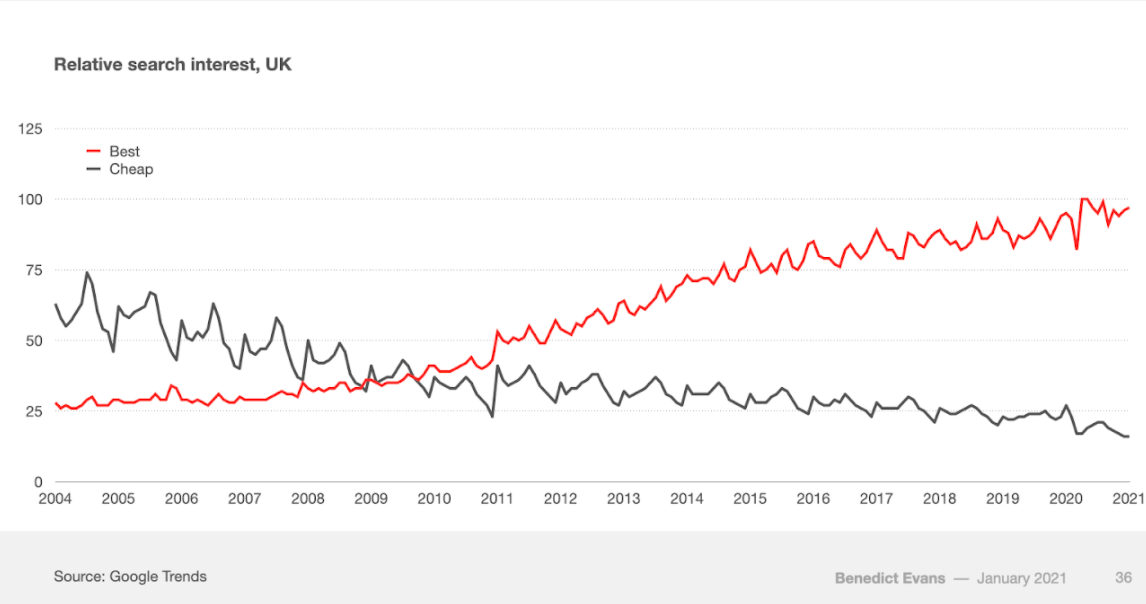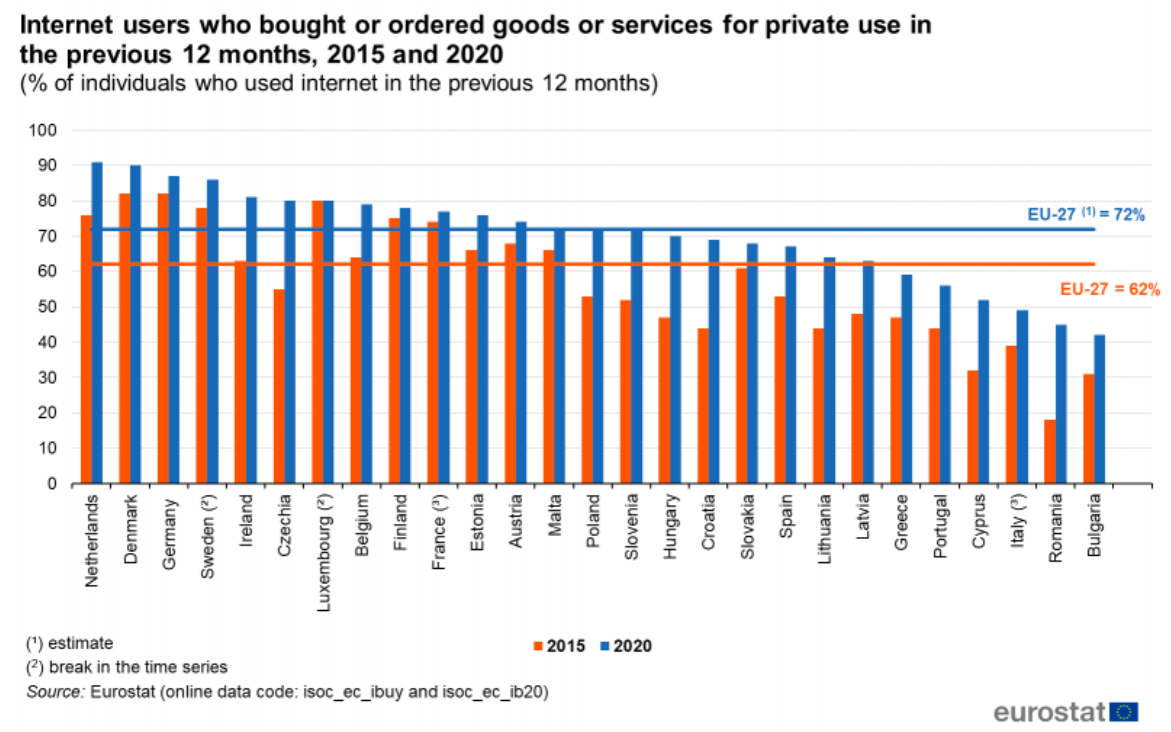- A thought provoking and contrarian read arguing that the tailwinds from the internet and silicon valley are fading i.e. the industry is maturing.
- This chart shows that growth rates are coming down in most areas of tech.
- Worth noting it was done in early 2020 so missed the pandemic driven acceleration (the unanswered question being whether that was just pull forward or a true step change).
- This type of environment leads to a rebalance of growth away from start-ups towards internet-first incumbents – as the former can’t rely on the market to grow and the latter use vast operational muscle.
- This has profound effects including the financialisation of the technology industry.
Misc
Miscellaneous is often where the gems are.
Power of a Story
- A really nice piece about the power of stories in academic research, investing.
- And even innovation as seen in these great extracts from Rory Sutherland’s Book:
- “Making a train journey 20 per cent faster might cost hundreds of millions, but making it 20 per cent more enjoyable may cost almost nothing.“
- “The Uber map is a psychological moonshot because it does not reduce the waiting time for a taxi but simply makes waiting 90 per cent less frustrating.“
- “It seems likely that the biggest progress in the next 50 years may come not from improvements in technology but in psychology and design thinking. Put simply, it’s easy to achieve massive improvements in perception at a fraction of the cost of equivalent improvements in reality.“
- Comprehensive and fascinating look at Reddit.
- The article covers its tumultuous founding (YC start-up) and history.
- The undervaluation vs peers – the latest round valued the company at $6bn or $115 per daily active user (DAU) vs. $400 for Facebook and $310 for Twitter.
- And finally possible areas of improvement and expansion.
- All interesting to read ahead of the speculated IPO.
Lessons from Gian-Carlo Rota
- Twelve lessons from the famous mathematician and lecturer.
- They relate largely to teaching and writing mathematics but, with Farnam Street’s magic commentary, they transcend to much of life.
- A nice quote from Feynman as well – “Richard Feynman was fond of giving the following advice on how to be a genius. You have to keep a dozen of your favorite problems constantly present in your mind, although by and large they will lay in a dormant state. Every time you hear or read a new trick or a new result, test it against each of your twelve problems to see whether it helps. Every once in a while there will be a hit, and people will say: ‘How did he do it? He must be a genius!’”
Electric Vehicles in Norway
- Fun story of how Norway became the leader in electric vehicles per capita.
- Spoiler – start with a passionate 80s pop band, sprinkle political will and add heavy financial incentives.
EU Covid Vaccine Efforts
- A long read on how it came to be that the EU fell behind on Covid vaccine supply.
- Interesting thoughts on the trade-offs of working as a block.
Best vs. Cheapest
- The internet is now more about recommendation and expertise than price comparison.
- h/t Benedict Evans.
The Future 100
- 100 trends “drawn from culture, technology, travel, branding & marketing, food & drink, beauty, retail, health, business and finance sectors.”
- Full of interesting ideas.
Complex Systems
- Anyone involved in financial markets should probably read this introduction to the study of complex systems.
- “There’s no love in a carbon atom, No hurricane in a water molecule, No financial collapse in a dollar bill.” Peter Dodds
EU eCommerce
- Amazing spread of prevalence of eCommerce across EU countries.
Private Stock Exchange
Hardware is Hard
- An interesting read on why life is hard for hardware start-ups – primarily the high upfront costs.
Benedict Evans Slide Deck
- Another fascinating must-see slide deck from Ben Evans on tech and media.
74 NYT Facts
- “Each day, our editors collect the most interesting, striking or delightful facts to appear in articles throughout the paper. Here are 74 from the past year that were the most revealing.”
- Great list from NYT. A few examples:
- “Brooks Brothers, which Henry Sands Brooks founded in Manhattan in 1818, is the oldest apparel brand in continuous operation in the United States.“
- “Often, the screams we hear in movies and TV are created by doubles and voice actors. One stock scream is so well-used it’s got a name, the Wilhelm. It’s in hundreds of films.“
Parable of the Pottery Class
- “The ceramics teacher announced on opening day that he was dividing the class into two groups. All those on the left side of the studio, he said, would be graded solely on the quantity of work they produced, all those on the right solely on its quality. His procedure was simple: on the final day of class he would bring in his bathroom scales and weigh the work of the “quantity” group: fifty pounds of pots rated an “A”, forty pounds a “B”, and so on. Those being graded on “quality”, however, needed to produce only one pot – albeit a perfect one – to get an “A”. Well, came grading time and a curious fact emerged: the works of highest quality were all produced by the group being graded for quantity. It seems that while the “quantity” group was busily churning out piles of work – and learning from their mistakes – the “quality” group had sat theorizing about perfection, and in the end had little more to show for their efforts than grandiose theories and a pile of dead clay.” (Source).
Climate Change Economic Impact
- Fascinating read about who stands to benefit in the very long run from a warming world.
- “Draw a line around the planet at the latitude of the northern borders of the United States and China, and just about every place south, across five continents, stands to lose out.“
- “Incredible growth could await those places soon to enter their prime. Canada, Scandinavia, Iceland and Russia each could see as much as fivefold bursts in their per capita gross domestic products by the end of the century so long as they have enough people to power their economies at that level.“
Decline in Animals
- Sobering chart – despite (or because of) a 97% rise in human population and 285% rise in GDP, since 1970, the population of vertebrate species has declined -60%.
Banned Words
- We leverage the Snippet ecosystem to expand our footprint holistically in the space we operate. We have a long runway for our KPIs. After all it is a global and iconic brand.
- A fun list of banned corporate “words” from FundSmith.
Vanderbilt
- Business lessons from a man who at one point commanded one in every nine dollars in the United States.
- “Vanderbilt’s legacy provides timeless and universal lessons in business success. He thrived in an era of enormous technological change as railways revolutionised the American economy. Yet his approach to business is evident in many of the successful businesses we see today; tapping new markets through lower prices, respecting shareholders, sharing scale advantages and sacrificing short term profits for long term gains.“




